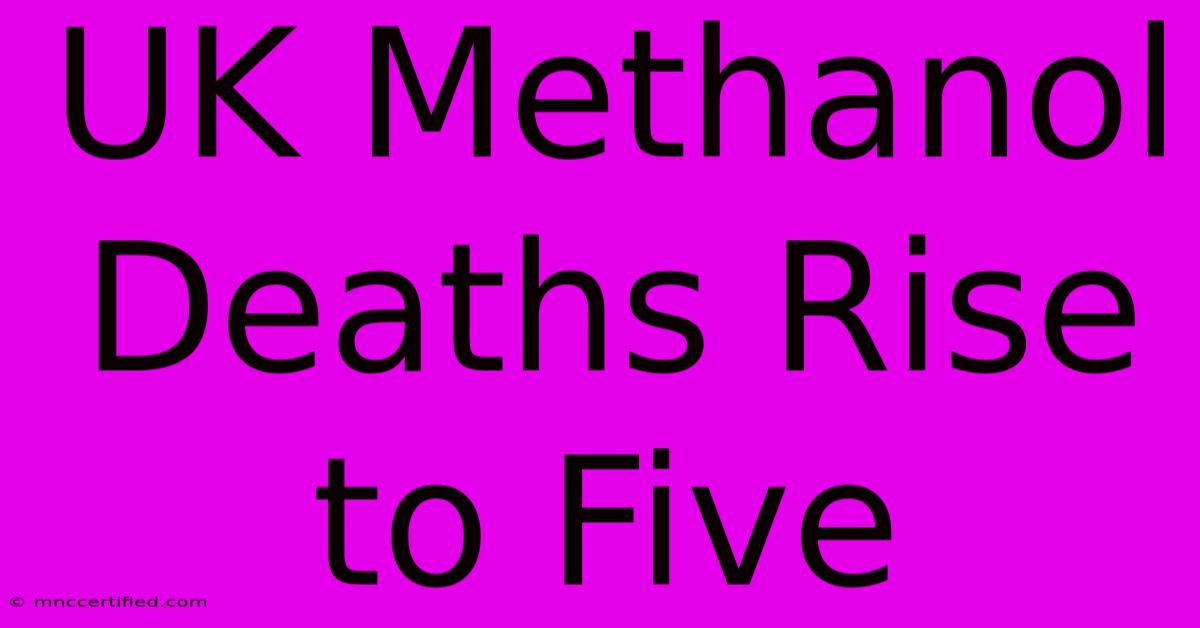UK Methanol Deaths Rise To Five

Table of Contents
UK Methanol Deaths Rise to Five: A Growing Public Health Concern
The number of deaths in the UK linked to methanol poisoning has tragically risen to five, sparking serious concerns about the availability and misuse of this highly toxic substance. This alarming statistic highlights the urgent need for increased public awareness, stricter regulations, and improved access to treatment. This article will delve into the details surrounding this public health crisis, examining the causes, consequences, and potential solutions.
Understanding the Dangers of Methanol
Methanol, also known as methyl alcohol or wood alcohol, is a clear, colorless, and odorless liquid that is highly toxic. Unlike ethanol (drinking alcohol), methanol is metabolized by the body into formaldehyde and formic acid, which are extremely harmful and can lead to severe complications, including:
- Blindness: One of the most devastating effects of methanol poisoning is irreversible vision loss.
- Kidney failure: Methanol can cause significant damage to the kidneys, potentially leading to kidney failure requiring dialysis.
- Central nervous system depression: This can manifest as dizziness, headaches, confusion, and in severe cases, coma.
- Death: In high doses, methanol poisoning is fatal.
Why is Methanol Consumption Increasing?
The reasons behind the increase in methanol-related deaths in the UK are complex and multifaceted. Several factors likely contribute:
- Increased availability: Illicit production and distribution of methanol-containing products, often disguised as alcoholic beverages, may be a significant contributing factor. The ease of access to these dangerous substances poses a considerable threat.
- Economic factors: The cost of alcohol can be prohibitive for some individuals, potentially leading them to seek cheaper, and often more dangerous, alternatives.
- Lack of awareness: Many people are unaware of the severe health risks associated with methanol consumption. This lack of education and understanding contributes significantly to accidental or intentional ingestion.
- Misidentification: The odorless and colorless nature of methanol makes it easily mistaken for ethanol, leading to accidental poisoning.
The Urgent Need for Action
The rising number of methanol deaths demands an immediate and multi-pronged response. Key actions include:
- Increased public awareness campaigns: Educating the public about the dangers of methanol and the importance of identifying and avoiding contaminated alcohol is paramount. Clear and concise information should be readily available through various media channels.
- Strengthened regulations and enforcement: Stricter laws and penalties for the illegal production and sale of methanol-containing substances are crucial. Enhanced enforcement efforts are needed to curb the supply of these dangerous products.
- Improved access to treatment: Ensuring that healthcare professionals are adequately trained to recognize and treat methanol poisoning is vital. Rapid and effective treatment is essential to mitigate the severity of the consequences.
- Collaboration between agencies: Effective responses require collaboration between law enforcement agencies, public health officials, and alcohol awareness organizations to tackle this public health crisis effectively.
What to Do if You Suspect Methanol Poisoning
If you suspect someone has ingested methanol, seek immediate medical attention. Time is critical in managing methanol poisoning, and prompt treatment can significantly improve the chances of survival and minimize long-term complications.
Conclusion: A Call for Collective Responsibility
The rise in methanol-related deaths in the UK is a grave public health concern requiring a concerted effort from individuals, organizations, and government agencies. By raising awareness, strengthening regulations, and improving access to treatment, we can work together to prevent further tragedies and protect vulnerable populations from the devastating effects of methanol poisoning. The future requires a proactive and comprehensive approach to address this escalating issue and safeguard public health.

Thank you for visiting our website wich cover about UK Methanol Deaths Rise To Five. We hope the information provided has been useful to you. Feel free to contact us if you have any questions or need further assistance. See you next time and dont miss to bookmark.
Featured Posts
-
Intel Briefings Shift To Mar A Lago
Nov 22, 2024
-
Multiple Accidents Car Insurance
Nov 22, 2024
-
Reverend Coles Net Worth Explored
Nov 22, 2024
-
Former Red Sox Pitcher Sale Wins Cy Young
Nov 22, 2024
-
Rooney Plymouth Coleen Jungle Venture
Nov 22, 2024